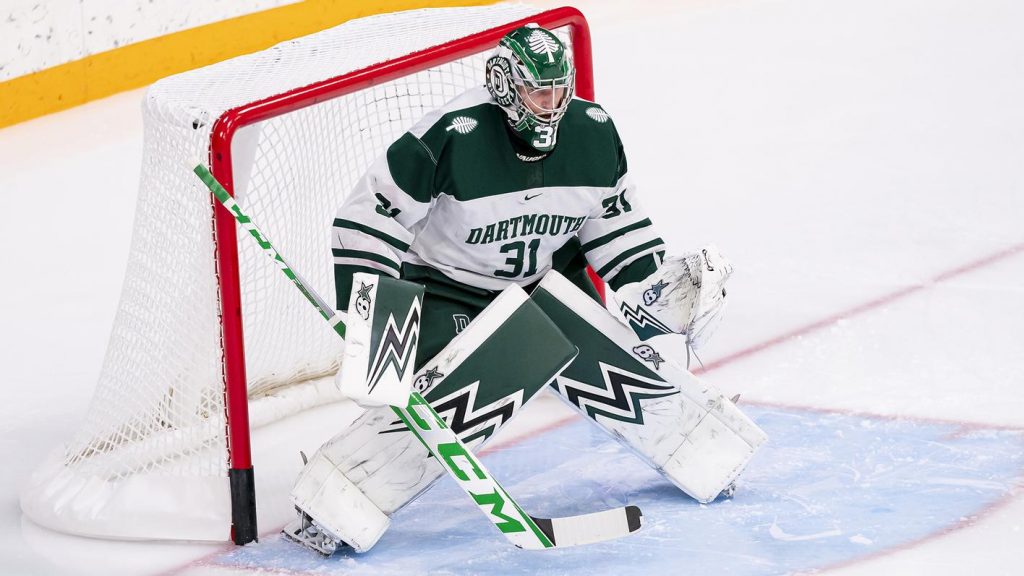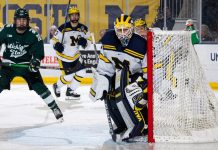
It’s impossible to win a college hockey championship in November.
A hot start doesn’t translate to the March postseason, and plenty of gelling rosters don’t reveal their true potential or greatness until league schedules buckle down for the post-New Year’s Eve second semester schedule. Ask any coach or player throughout college hockey about when they want to be playing their best hockey, and nobody ever talks about a preseason poll or the desire to be undefeated in November.
On the flip side, plenty of teams have lost their shot at trophies or banners by not living up to expectations in the first weeks of the year. Key losses and ill-timed point deductions from an overtime or shootout don’t look like much when 20-plus games remain, but the points lost from those early games can have a butterfly effect of costing a team a more advantageous seed.
Teams that started slow have cost themselves home ice in the postseason by blowing one or two points on a bad night, and the same coaches and players who want to play their best hockey in March also don’t want to lose key points during those same early season meetups.
It’s all about balance, and this past weekend offered a glimpse of how a growing and developing team can help its future cause when Dartmouth took five points from Quinnipiac and Princeton to continue a season start that began by taking one point from Harvard during the 18-round shootout two weeks ago.
“It was an interesting scenario,” said Dartmouth coach Reid Cashman. “We came out of Harvard and UNH on opening weekend, and we were pretty beat up. We were down our captain, Sean Chishom, and another forward in Cooper Flinton, while also playing down a couple of defensemen. So the mindset was really to be as strong as we could be as a group because it was going to be the five men on the ice for each shift against whichever five men were on the ice [for Quinnipiac and Princeton], and we had to win that shift with whatever role we were asking the guys to play because they were playing in elevated roles. That made it kind of simple, but our group really bought into that.”
Finding their fight and compete level allowed the Big Green to earn points by blending shifts and players into a gritty, no-nonsense style, and the comeback against Quinnipiac on Friday night all but illustrated exactly how Dartmouth sought to play. Both goals tied the game after the defending national champion Bobcats scored to take a one-goal lead, but each featured a player crashing the net or making a blue-collar hockey play that doesn’t show up on a stat sheet.
Both goals involved players that weren’t necessarily top goal scorers last year, and both were the first goal of the season for Joey Musa and Luke Haymes. Haymes had been at least a 10-goal scorer for the team last year, but Musa’s six-goal output over his first two seasons felt like a footnote after he registered a goal with first career point assists for Oskari Vuorio and Eric Charpentier.
“We were learning from each moment,” Cashman said, “and that’s the best thing that this group has done. I’d even say that it started in the spring and grew from last year since this group kind of took each moment to make themselves the best version of themselves at that moment. Learning from that, we’ve done a really good job where we’ve been able to have three freshmen defensemen play every day by being thrown into it. Based on the backing of our group, we’re willing to learn and continue to grow into whatever happens in that particular moment.”
Seizing and living in the moment allowed Dartmouth to score the extra point against Quinnipiac one week after the 18-round shootout against Harvard ended with zero goals against the Crimson and a lost extra point. Still gaining the one point helped, but the Big Green ended the shootout against the Bobcats early by once again leaning on goaltender Cooper Black to shutout an opponent in the extra session. Nikita Nakora then shot the final round past Quinnipiac’s Vinny Duplessis, and a last chance went by the wayside to give the home side the extra point against a team that hadn’t officially beaten the Bobcats since the pre-Covid era.
One night later, the lessons again were on full display when the Big Green watched Princeton score two power play goals to erase two separate one-goal leads in the first period. It followed a trend where Dartmouth scored and took a penalty before surrendering the extra-man goal over the span of less than a minute during the first five minutes of the period, so in the second period, Braiden Dorfman teamed up with Musa to pot two straight goals past the Tiger penalty kill.
Even then, the lead didn’t hold, but playing the full 60 minutes allowed CJ Foley to score with less than a minute on the clock and less than a minute after Jaxson Ezman tied the game at 4-4, and for the first time this season, a three-point product stayed in New Hampshire by defeating an opponent that swept Dartmouth last season.
“Teams like Harvard, Quinnipiac, and Princeton are exceptional hockey teams,” Cashman said. “Princeton’s roster is really good right now, and to get points in all of those games means a lot for our growth. If we want to have any chance to climb up the ECAC standings, you have to take points on the weekend, especially at home. And we did that with three really good opponents.”
Understanding what that means to the program is a big lift at a time when fans are streaming back into college hockey arenas. Thompson Arena was filled to nearly 75 percent for the Princeton game on Saturday after the Friday night tie, but the weekend itself gave the Big Green their best weekend against the league’s southern contingent since they swept both teams at home at the end of Feb. 2015.
Point structures aside, it’s a mega step for Cashman’s crew, which now sits next to Cornell in the league standings ahead of Friday night’s game in Ithaca, a game that’s all of a sudden become a sneaky big game for the first half of the year. Both teams are tied with six points, but the two-point differential over Quinnipiac and Brown won’t clinch much until the season really ramps up. That said, points this weekend could set a pace for the rest of the year with an unlikely breakout team leading the charge behind a system that’s starting to bring it closer together.
“Winning’s a big part of getting fans into our team,” Cashman said, “but now we have to do our job. I know this community is strong. The history of hockey support is extremely strong and the better product we can put on the ice, the more we can enjoy those crowds at Thompson Arena.
“Heading to Cornell this weekend was always a lot of fun for me. I’ve always enjoyed it as a coach, and it’ll be exciting for us to get on a bus on Thursday and head that way to play a top-10 team [to start the weekend].”
Dartmouth and Cornell drop the puck at 7 p.m. on Friday night with Saturday night’s game at Colgate also set for a 7 p.m. faceoff.


